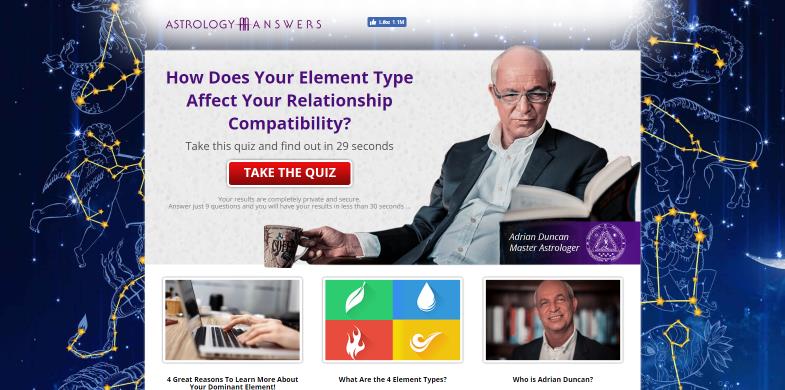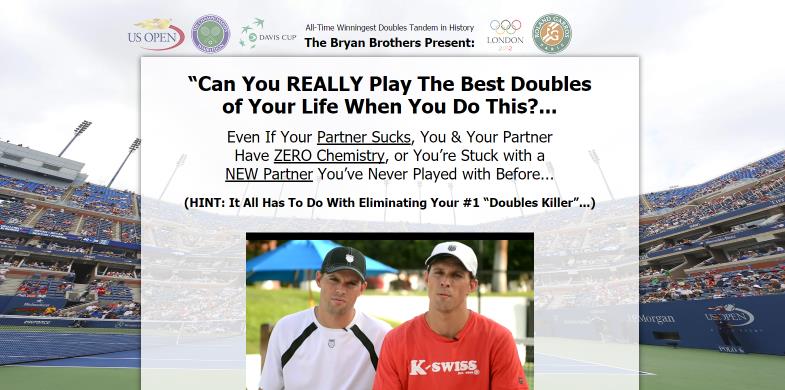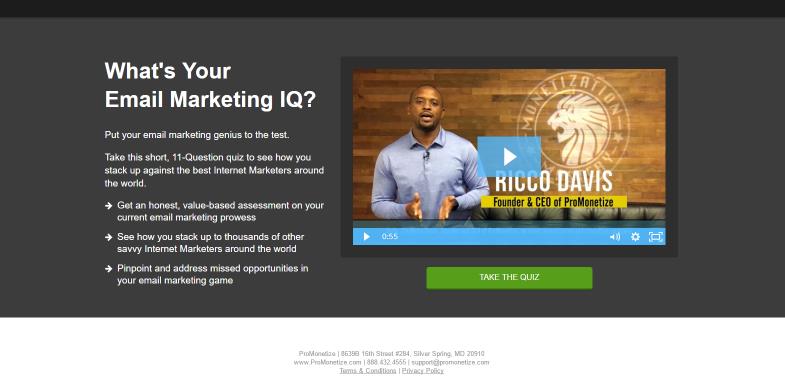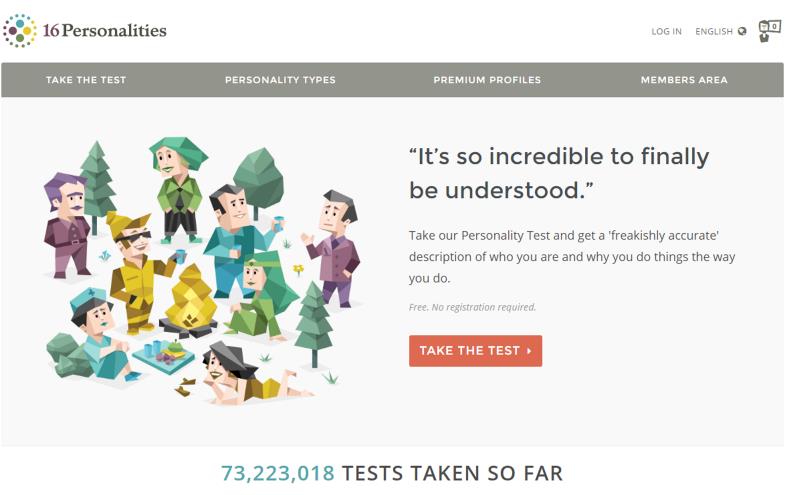For Sale For Rent: One Slightly-Used Direct Response Copywriter Brain With A Distinct Lemony-Science Flavor To It
When I was five years old astronaut Neil Armstrong stepped off the lunar lander in 1969 and ushered in an era of science that seemed ripe with the promise of interplanetary travel.
Honestly, I don’t remember a single thing about that Apollo 11 mission to the moon.
I do however recall a large color poster bearing an image of Buzz Aldrin in his white space suit (though I had no idea who he was at the time).
That poster decorated my bedroom wall for the remainder of my childhood and made an impression on me that has survived undiminished to this day.
The image showed Aldrin standing on the surface of the moon amid an endless expanse of grey dust.
You could tell he must have been staring into the camera, but his face was hidden behind the reflection from his visor of the lander nearby.
There he was, a human being on a distant world, essentially cut off from everything that we take for granted, not the least of which is the very air we breathe.
In his curved faceplate Armstrong could also be seen as he snapped the now famous photograph, his own image compacted down as though the viewer were peering through the wrong end of a powerful spyglass.
Every time I gazed up at that faceless astronaut in his bulky life-sustaining suit, even at that age, I couldn’t help but think that science was a freaking awesome enterprise totally deserving of my attention.
Perhaps not too surprising then that decades later, as a copywriter (and as a former scientist) looking around for an area of specialty with some element of science to it, my sights have now settled on the health supplement industry.
Sure, you could reasonably argue the point – and I’d likely end up agreeing with you – that most of these products simply don’t live up to their “scientifically-backed” health claims.
On the other hand I think it would very difficult to argue the case that there simply isn’t enough good nutritional science available today to be confident that high-quality supplements can be formulated by those who take the work seriously.
As far as I can tell, dietary supplements really do have the potential to change lives for the better.
That’s something I can get behind.
I’m also encouraged by the news that, according to a 2016 report published by Grand View research, the size of the global health supplement market is projected to reach US $278 billion by 2024.
That’s a LOT of vitamins and protein powder.
Surely then, room enough for at least one more copywriter with a science background!
But, even if in the back of my mind as I write this article I might be thinking of how best to use the marketing strategies outlined here to sell more health-promoting herbal pill and powders, you needn’t feel so constrained.
Because everything I am about to tell you now applies to pretty much anything you would like to sell online today.
If you’re not entirely satisfied with the way your business is shaping up, and you’ve begun to suspect there must be a smarter way to make sales than the approach you are taking right now, then you’ll likely find what follows both interesting and potentially applicable to your business – whatever its nature.
Or, to get right to the point…
This ad strategy is for online vendors who want to scale up their marketing, sell in volume, and make a whole LOT more money
Let’s talk about your sales message – the idea behind the reasons you give your prospects for why they should pay attention to what you are saying, and why they should ultimately buy from you.
Now, there is certainly more to the art of selling in volume than just being able to get your sales message correct, whether we’re talking about the messaging in your ads, on your sales page, or in the follow-up communications you send to newly-acquired leads.
But getting your sales message dialed in IS an incredibly important part of the process and it’s the one I’m going to concentrate on for the remainder of this page.
Also, I’m going to focus on it partly because people who sell for a living (hopefully that’s you, Dear Reader) tend to spend an awful lot of time trying to come up with the right sales message.
Of course there’s a very good reason for this.
It has to do with the consequence of NOT hitting on the right sales message.
Trust me, you’ll recognize the signs when this happens to you – they are unmistakeable.
If the first thing that pops into your head as you wake each morning is the realization that you’re out of business, your spouse has divorced you, and you’ll be lucky if you get to spend a few precious hours with your kid every other weekend for the next decade – you’re there.
Wowza. I have lived that life, and as you might expect, I totally recommend you try to avoid it at all costs!
And you can – but only IF you get that sales message right.
Because that’s when life has the potential to change dramatically for you…
When you’re waking up each morning to discover that your sales machine has has been chugging effortlessly through the night, quietly converting prospects into customers as you slept, then everything about where your life is headed changes for the better.
Now you have the option of moving your family into that sweet mansion on the hill.
Imagine: Instead of hearing from your kids as they disappear into their bedroom for the night that “You’re the SUCKIEST parent that ever lived!” now they’re bringing their friends home to frollick in your newly-acquired heart-shaped swimming pool that once belonged to some seventies-era movie star.
Now you’re the world’s COOLEST parent.
Not only that, but nobody is going to think too badly of you when they discover how giddy you get hearing your better half brag to friends about how they just knew their unwavering FAITH in you was going to pay off.
Because let’s face it – it could have gone completely the other way.
So let’s think about that for a minute.
Why mightn’t it go your way?
Even if your product is great and you truly deserve a slice of the good life you’ve been chasing, what exactly might stop you from being the hero of your own story?
It all boils down to just one thing, it’s the same thing that is keeping every other online vendor awake at night right now, and it is this:
What worked so beautifully yesterday to make the sale is looking awfully rickety for the advertising world of tomorrow
Not so long ago, perhaps all that was needed to lure a prospect to your web site was the promise of an appealing product benefit.
But now your audience of potential buyers can barely detect your message above the din of competing advertisers who come at them every hour of the day.
In 1962 David Ogilvy dutifully noted in Confessions of an Advertising Man that television viewers were subjected to about 10,000 commercials every year.
In 2006, the New York Times reported that Americans are exposed to more than one hour of television commercials every day – or in terms of roughly equal numbers of 15-second and 30-second ads shown in a given commercial break, around 58,000 television ads every year.
That was more than 10 years ago and doesn’t even factor in ads that we are exposed to through radio, print publications, or the internet – which itself in terms of ad spend in 2017 became the largest advertising channel in existence (for the first time larger than television itself).
Any way you look at it, we are being inundated with sales messages.
And because of this level of advertising saturation there’s a very good chance that no matter how smart, on-point and valuable your message might be to the right audience, you might as well never have bothered to give it “air time” at all.
Not if your message is going unnoticed.
When you fail to get the attention of your prospect you can forget about having them sit with your message as long as it takes for that “I gotta have your life-changing doo-dacky right now” directive to percolate up through their defensive buyer shields.
Instead they’ll likely end up buying from someone else, even if your offer is far superior to what they purchase from your competitor.
So how do you get around this “market penetration” problem?
What does it currently take to:
- Win the attention of prospects.
- Make the kind of impression that has your prospect feeling as though you’ve somehow penetrated the very shell of their soul (so they cannot help but pay attention to what you have to say).
- And KEEP doing it until they crack like a container ship tossed in stormy seas and offer you their wallet?
The answer is that you start thinking like the marketer of tomorrow.
You recognize that there has been a steady evolution in market awareness of what might be possible in the context of online selling and that on the technology side there is very little we can’t do today if we are just willing to apply ourselves sufficiently to the problem.
One very important consequence of all this is that:
In Advertising It No Longer Pays To Treat Every Online Prospect As If They Were Cut From A Single Mold
Until now it might have seemed convenient and cost-effective for us to do this, and in practice it was usually possible to get away with it.
But that’s not going to be true for very much longer.

Treating your customers as though they are all cut from the same mold limits your ability to engage with them. [image credit: ETSY.COM]
The one-size-fits-all approach to marketing is simply becoming less cost-effective as the market gets more sophisticated and demands more respect from us.
Whether we like it or not, if we want to make any kind of lasting impact in our market we are going to have to abandon the use of appeal to the masses sales psychology.
That approach works only up until the point when the market develops a keen awareness that what they want from us is more than what we’re promising them.
And more than what we could provide them if we’d only try a little harder to push past our currently watered-down understanding of what’s really bugging them.
The alternative (common sense alone suggests this has to work better) is to begin leveraging an approach that puts the wants and needs of single prospects ahead of our own immediate desire to get them to buy something.
If you’re thinking it’s beginning to sound like some hard work lies ahead of us if we want to fix this problem, you’re right.
Wussies may now leave this page through the door to your left… thanks for visiting.
For the rest of you, lean in.
I’m not going to lie to you.
What we’re about to discuss isn’t magic, even though sometimes the results it generates can seem that way.
It isn’t ABC simple to implement either.
Sleeves will need to be rolled up, brows will furrow, and you may feel the intense heat of discovery that comes at the end of long hours wrapped in contemplation about how to proceed.
But that’s par for the course where we’re headed – if your primary objective right now is to dominate your market.
Luckily For Us There’s Now An Algorithm To Reclaim Our Marketing Mojo
al·go·rithm – noun – a process or set of rules to be followed in calculations or other problem-solving operations, especially by a computer.
One of the great advantages of operating a business online is that you can literally implement algorithms as a computer-driven set of operations.
The consumer’s browser and your web server can be programmed to work on your behalf as a sophisticated automated and customized marketing system.
A savvy, next-generation lead-generating sales algorithm.
To explain how this algorithm works – well, very roughly – let’s break it down piece by piece, beginning with how to get yourself noticed.
Let’s say you were in the market for a direct response copywriter.
This, of course, would be someone like myself who specializes in penning the kind of copy that leads your prospects by the nose to a desired action – usually a lovely income-generating sales transaction, which is the ultimate goal of the algorithm.
And let’s suppose you happened to need such a fine craftsman of the salesy word because of your burning desire to sell something.
For example:
- a never-before-heard-of medical device that edits gene sequences
- a scientifically-formulated nutritional supplement that rebalances hormone levels
- a factory-powering, energy-blooming arc reactor from the gleaming catalog pages of that most marvelous of technology companies, Stark Industries.
If any of this was true and I appeared in front of you waving a large placard bearing the words at the beginning of this article I’m betting I would get your attention.
For Rent: One Slightly-Used Direct Response Copywriter Brain…
Almost certainly I would OWN your mind for at least the next few seconds.
That’s because my message would NICELY COMPLEMENT to the one already looping in the background of your thought processes.
The one that sounds an awful lot like this:
“Darn, I sure could use someone who knows how to write sales copy, who gets where I’m coming from, and who can see just why my sciency doo-dad has the potential to change the world…”
Yes, I may be projecting a little in the way of my personal preference for what the ideal client might look like.
But to see how clinging inadvertently to a one-size-fits-all approach to marketing might damage your business in the coming years I don’t need you to be a science-and-technology-obsessed billionaire playboy inventor of supercool gadgets, as nice as that would be…
I will say though, if you DO happen to be the next up-and-coming Tony Stark, let’s talk – I’d love to help you get that shockingly expensive reactor-powered glowing orb into the hands of the people who need it most!
No – what I’m going to suggest is that we can do BETTER than come up with advertising messages that nicely complement the general nature of the desires and aspirations of our market.
What if, instead of using the current message scrawled on my placard, I somehow figured out that you were in the business of manufacturing state-of-the-art jet-propulsion devices for NASA, and I updated my message to this:
For Rent: One Slightly-Used Direct Response Copywriter Brain With A Strong Disposition For Planetary Science Gigs
Now you’d be high-fiving your monitor and dying to know more about what exactly it is I have to offer.
All because I narrowed in on the true nature of your problem (which is that you are badly in need of a rocket-science-friendly copywriter) and then offered a potential solution which almost exactly mirrors your needs.
The method for sharpening your sales message this way is what makes the algorithm that we are going to employ so powerful.
Here is how it works:
It’s Built On A Self-Diagnosing Quiz That Identifies Your Prospect’s Real Pain Point…
Yeah, you basically just ASK THEM what their real problem is before offering them the solution that best meets their needs.
Admittedly this sounds shockingly simple.
But in practice there’s a LOT that needs to be done to dial in your self-diagnosing quiz, and to come up with the customized sales funnel that ultimately compels your prospect to do business with you.
The finer points of this process have been spelled out in great detail in Ryan Levesque’s ASK Masterclass program.
If you’re new to the approach you can get the “Cliff Notes” version of the ASK Method here: as a paperback book.
To see how this works in more detail, let’s consider a concrete example of such a quiz in action.
The year is 2035 and after more than three decades of preparatory work and development in space exploration technology Elon Musk’s company SpaceX is almost ready to begin sending people to Mars, fourth planet from the Sun.

Mars beckons. Do you have what it takes to answer its call? [image credit: NASA]
Now SpaceX needs volunteers for its 5-year astronaut training program.
But not just ANY volunteers, the right volunteers.
These are people who won’t just be an excellent fit for the program.
They’ll also be willing and able to come up with the $250,000 required for admission to the company’s private SpaceX Astronaut Training Institute situated in the Askja caldera of the central desert highlands of Iceland.
SpaceX has done its research and determined that FIVE broad astronaut types will need to be deployed on its early missions:
- ASSEMBLY SPECIALISTS
- TECHNICIANS
- FARMERS
- SURVEYORS
- NIGHT SHIFT WORKERS
But the company is not about to ask its prospective interplanetary work force what job description sounds the most appealing to them.
There’s too much at stake here to leave such an important decision to the whim of the applicant.
For example, Ima Nightlover would tell you how she’s perfectly suited for the Mars graveyard shift because she’s done it for the last decade as an attending nurse at North Valley Hospital in Boulder, Colorado.
But does she really possess the mental fortitude to handle an eight-hour night shift working alone in the remote pitch black canyons of Olympus Mons with just a radio link to base camp as her lifeline should something go wrong?

If your passions include wide open spaces and rock-collecting you might enjoy the life of adventure afforded members of the Mars surveyor group. [image credit: NASA]
So instead SpaceX is going to implement an algorithm (there’s that term again) that best matches the job type to the specific skillsets and aptitudes of the individual candidates.
They’re going to market this opportunity for interplanetary adventure on a customized per applicant basis.
Not only because it is the best way to find the right candidates for the available jobs, but because it will allow the company to present a personalized sales message.
A sales message so focused on promising what the candidate is looking for that they will find it all but impossible to resist…
And the tool they’ll use to fill the slots of their Martian job vacancy program is a quiz.
One that conjures the romance of an off-world adventure by prompting prospects to “Discover your Mars Explorer Job Type”.
Note that the company is not advertising that it has jobs available.
That will come later, after they have rounded up the right kind of candidates – people with a strong interest in planetary exploration.
By raising a question in their minds that it promises to answer for them, the quiz forces people to stop and give it their attention.
“Huh. That’s a really good question,” they think to themselves. “What IS my Mars explorer job type?”
Figuring out the right theme for your quiz can make a huge difference in how well it performs (what percentage actually complete the entire quiz).
Get Your Appeal Right And People Devour Your Quiz To Become Red Hot Leads…
When the Dutch company Mars One announced in 2012 that it was looking for volunteers for a one-way mission to the red planet it noted in its advertising that the first mission would be manned by just four crew members.
In response, the company received 202,000 applications.
One-way, mind you – you go, and you never return from that cold rusty ball of rock.

Technicians wanted for working holiday. Build cable cars and see Mars. Courtesy of the Mars Colonization And Tourism Association. [image credit: SpaceX]
Me, I think I’d rather wait for SpaceX to get those wrinkles in its return-capable rocket ships ironed out.
I mean, what’s the rush, right?
So, even knowing ahead of time that there is no shortage of volunteers for a trip to Mars, the Mars Explorer Job Type quiz is not designed to sell prospects on the idea of applying for a dangerous job in a remote location.
At least not explicitly.
What it is designed to do is offer those who take the quiz a short series of questions that take into account the realities of life on Mars.
By running simulations back in its labs SpaceX has been able to figure out how to map quiz responses to a “best guess” job type.
The quiz taker is therefore being offered a way to learn something about themselves that they might otherwise never have been able to figure out on their own.
But for the seller it’s an even sweeter deal:
Quiz Takers Will Literally Tell You What To Say To Compel Them To Buy From You
They do it by literally self-selecting themselves into one of a number of buyer “buckets”.
In this case it’s the five Mars job types that best characterize their suitability for employment as a Mars explorer.
It’s worth noting that SpaceX was able to determine the nature of these buckets WITHOUT needing to first take into account what the applicants might be looking for in a job (the demanding nature of the work environment dictates the sustainable job types).
On the other hand, if SpaceX was a video game company the selection of buckets might be a much more fluid process.
For example, now the company’s game programmers can engineer from scratch the exotic location that is to be inhabited by their virtual astronauts, and the entire gaming experience could be tailored around the jobs that the players deemed most attractive to them.
In this case the jobs would determine the working environment, and not the other way round.
Luckily there’s a protocol in the ASK Method algorithm for instances like this that allows one to figure out the buckets based on an initial “deep dive” survey of the wants and needs of the market.
This “deep dive” analysis might reveal, for example, that a large number of male game players would prefer to be heavily-armed keepers of the peace – the Martian equivalent of “Texas Rangers” complete with law-enforcement badges, gunbelts and holstered weaponry.
The video game player wants and needs would determine the relevant buckets and those in turn would determine the nature of the quiz to be offered to potential players when it came time to market the game.
Whether or not a deep dive survey is actually needed to figure out the buckets in a given circumstance, quiz development is a straightforward, but possibly involved process – one that requires you to:
- Determine the buckets which best characterize the predicament of your prospect.
- Based on the nature of buckets determine the most appealing type of quiz you can offer.
- Use the quiz to diagnose the prospect’s exact problem, then offer to prescribe a solution.
It’s The Ability To Diagnose Their Problem And Prescribe A Custom Solution That Will Turn You Into Salesperson Of The Year
Because while everyone else has shied away from having to roll up their sleeves and put in the work needed to implement a full-scale lead-generating quiz, you’ve paid your dues.

Hardy, highly self-motivated workers needed today. Strong improvisational skills and an unshakeable frontiersman “can do” attitude are a must. [image credit: NASA]
Nadine, based on the answers you provided to our Mars Explorer Job Type quiz we have now determined that you are most qualified to serve as a member of our prestigious group of New Frontier Surveyors…
How about that?
Remember that innocent-looking question you answered in the quiz about things you like to do most in your spare time?
Now you’ll be enjoying long walks and partaking in exotic sightseeing opportunities as you chart unexplored terrority at the furthermost edge of human existence.
But even if you’re not yet ready to commit to the job experience of a lifetime SpaceX isn’t finished with you.
Because to get that final assessment from them you had to supply your name and email address.
SpaceX can now contact you as often as they like to follow up with one good reason after the next as to why you belong in their astronaut training program.
So what does the final quiz look like?
To find out, and as a lesson in what it takes to field one of these ASK-style quizzes I went ahead and fleshed out a demo Mars Explorer Job Type quiz.
As an aside, I did it the HARD way – I built the quiz from scratch without the assistance of quiz-building software, just to see how difficult it really is (answer: it’s a definite challenge!).
Luckily you may never have to take that approach because software does exist for the express purpose of building ASK style quizzes.
Currently Bucket.io, which is now owned in part by Ryan Levesque, the creator of the ASK Method, is a very capable quiz-building platform.
It’s not inexpensive, and there’s something of a learning curve to getting your quiz to look and act the way you imagine it should, but it’s a heck of a LOT easier than trying to solve all the challenges of building a quiz yourself.
At any rate, in the end I was able to construct my quiz that allows peope to figure out their optimal Mars explorer job type, and get it working just the way I wanted.
If you want to know more about how I did that and get access to it I recommend hopping onto my newsletter where I discuss the ASK Method and quiz-based lead generation strategies in more detail.
Here’s a screenshot of one of the questions asked in the quiz:
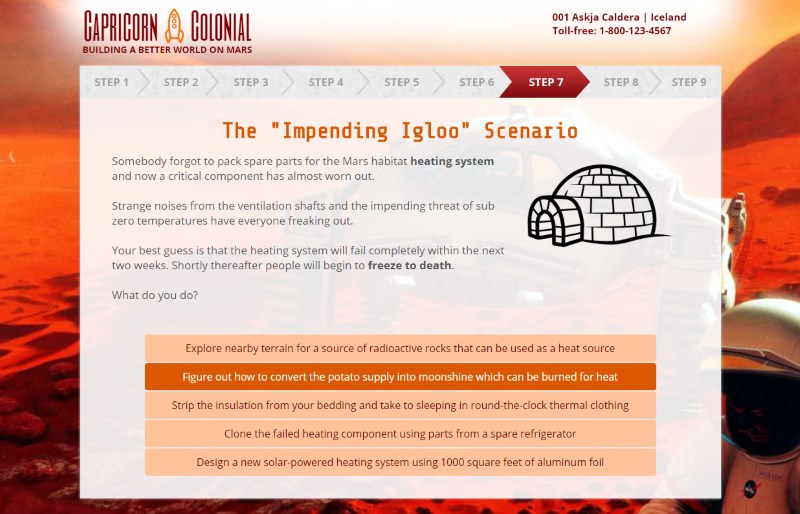
The Mars Explorer Job Type Quiz
Part of this particular quiz involves presenting the user with a series of “challenge scenarios” and asking them to select what they consider to be the most appropriate course of action from the five possible responses provided to them.
Each one of the responses carries with it a specific bias towards the mindset of one of the five worker types.
That’s how we are ultimately able to select an appropriate Mars explorer job type, or bucket, for each person who completes the quiz.
At the end of the quiz we announce that the job type has been determined and then request a name and email address from the quiz taker if they want to be emailed their job type.
This is how we get our lead onto a bucket-specific list and proceed to follow up in the days and weeks ahead with messages carefully designed to appeal to the specific segment defined by the selected job type.
“Sounds Great. But Really, Isn’t This Just Too Much Work For Me To Implement?”
It actually IS a lot of work to build a full-scale quiz, I’ll grant you that.
In fact when I was first exposed to the ASK Method I up and quit on it after promising myself I’d give it everything I had to fully learn the system.
But the sheer scope of the skillset required to piece it all together was overwhelming.
“No way the average marketer can implement this without a team,” I told myself.
I think this is still true.
But after spending more than a year deliberating on it I decided to relearn the system.
PLUS I discovered on the second go round that there are “lite” non-quiz versions of the system that one can put into place first so as to save on time and money.
Then when you’re sure people actually WANT what you are offering and are prepared to BUY it you can look at pulling out all the stops and implementing a full scale quiz.
I’ve discussed this approach in more detail in How To Survive Building Your First Ask Method Sales Funnel.
I’m both a copywriter and a technical guy.
I was originally trained in the sciences (theoretical physics), so I’ve spent a lot of time over the years programming for one reason or another.
In the academic setting I have created software programs that computed the evolution of dynamically-evolving physical problems of such underlying complexity that my brain chemistry was often affected due to a combination of lack of sleep and the intense need to know just what the final answer would look like.
Elsewhere (out in the corporate world) the problems to be solved were of a less altruistic nature, but often just as challenging.
In short, over the years I have had the opportunity to work on all sorts of highly technical projects, proving that I’m not a complete dummy.
So when a guy like me looks at the totality of the ASK approach to sales funnels and says “Whoa, this is all a little too much!” it really ought to give you pause.
But not so much that it should stop you if you are absolutely determined to offer your target audience the best possible sales experience.
It certainly didn’t stop any of the following marketers from doing it.
Full-Scale Quizzes Spotted In The Wild
Now that I am fully aware of the ASK method approach to using quizzes for lead generation I have noticed they are becoming quite common.
Not all of them are brilliant examples of what can be done with quizzes – but a few are worth mentioning here because of what they demonstrate about the most common TYPES of quiz that tend to be successful.
WEIGHT LOSS TYPE QUIZ
One of my favorite ASK method quizzes was created by Real Dose Nutrition.
The quiz was designed to generate leads for this supplement company’s flagship product – Weight Loss Formula No. 1.
This quiz has been hugely successful, designed as it was to segment its audience into one of four different buckets, each focused on a specific weight gain issue that centers around a particular metabolism-related hormone that might be “out of whack” in the body.
In fact this particular quiz had been responsible for generating more than 2.6 million opt-ins (subscribed leads) within the first 18 months of its deployment (and millions more since that time).
These buckets are characterized as weight loss types largely controlled by the action of a single hormone.
Once the relevant hormone which may be responsible for unwanted weight gain has been identified, the Real Dose founders, one of whom is a doctor, can focus their follow up sales messaging on the need for the prospect to address the issue surrounding their correctable, but unbalanced hormone(s).
ASTROLOGICAL RELATIONSHIP COMPATIBILITY QUIZ
Another nicely-implemented ASK method quiz involves revealing for the quiz taker their earth, water, air or fire elemental type.
According to the Astrology Answers site responsible for the quiz, this information about the fundamental nature of your personality type can be used to better navigate both your career and romantic relationships.
While I personally don’t place much stock in forecasting based on astrological signs, a lot of other people do, and they are only too willing to spend a couple of minutes to go through the quiz and sign up to learn the results.
TENNIS DOUBLES KILLER QUIZ
In addition to quizzes based on types are quizzes based on a predominant mistake, or killer action, that might be blocking one’s ability to proceed in some area of their life.
This kind of quiz works particularly well for sports-related products, like for example tennnis instruction.
The guys at Fuzzy Yellow Balls were one of the original success stories of the ASK approach to quizzes and they have gone on to develop an array of quizzes to generate leads for a slew of tennis-related products covering such areas as serve technique, serve power level, and doubles player coordination and efficiency.
EMAIL INTELLIGENCE IQ SCORE QUIZ
The last common type of quiz involves not types, or killers, but a score.
This is especially useful when the product or service you are promoting involves mastery of knowledge, where the more you know, the higher you are likely to score when tested on that subject.
In this example, which encourages internet marketers to find out how knowledgeable they are on the topic of email marketing, the final result of taking the quiz is to learn your email marketing IQ – an intelligence score.
Nobody likes to score poorly on tests of this type, so there can be considerable incentive on the part of the quiz taker to make a follow-on purchase for a product that offers to boost that score.
Seen enough?
OK, one last one to see if you can spot the reason I have included it here.
PERSONALITY TYPE QUIZ
This last real-world example is NOT an ASK-inspired quiz like all of the others I’ve introduced to this point.
But this quiz from 16 Personalities works in exactly the same way as all the previous ones in that it also encourages you to learn something about yourself that you likely wouldn’t know if you didn’t take the test.
This is yet another quiz of the type variety.
When you take the quiz you get the chance to find out just which of the sixteen personality types best describes you (incidentally every one of them turns out to be highly flattering, falling as they do into one of the four go-getter classes made up of Analysts, Diplomats, Sentinels, and Explorers).
Apparently I am an INTJ-A type which means I totally rock at building things (an Architect type according to the creators of the quiz).
Have you figured out yet why I felt compelled to bring this quiz to your attention?
Check out the quiz-taker count at the bottom of this first page of the quiz – more than 73 million people had taken the quiz at the time I snapped the screenshot.
In the week between the screenshot and me coming back to edit this article more than a million more people had taken the test!
If you wanted to sell a premium personality profile (which is EXACTLY the business model behind 16Personalities.com) do you think this might be an incredible way to get targeted leads for your product?
In Summary: One Size Fits All Marketing Is No Longer Effective – So Do This Instead…
By now you should be starting to wonder just what kind of quiz you could you use to sell your thing.
The odds are good that there’s an optimal ASK-style funnel based on a quiz that has your name on it just waiting to be built.
Something that has NEVER been seen before, simply because no one has taken the time to try to imagine it.
What if you could be the first one in your industry to do so?
Where might that take you?
If this is your first exposure to Ryan Levesque’s approach to customized sales messaging and lead generation you might be feeling more overwhelmed than inspired right now.
But that’s OK, it’s a lot to take in the first time you come across it, so allow me to recap the highlights of this article:
- To reach your target audience and make the strongest case for your offer, customized messaging is essential. The era of one-size-fits-all marketing is rapidly drawing to a close.
- One well-defined procedure for generating custom sales messaging that efficiently targets distinct segments of the market involves the use of quizzes. This is the ASK approach.
- A growing group of ASK-trained copywriters and funnel builders are actively engaged in bringing awareness of this new procedure (or algorithm) to those who can benefit from it. I am one of them.
- By imagining a marketing campaign that recruits applicants for jobs on Mars, I was able to demonstrate what is involved in setting up an ASK-style lead generation quiz.
- I noted that this method isn’t for everyone – because it IS hard work. Then again, the payoff can be HUGE for serious marketers with the right mindset (and maybe you are one of those people).
- I pointed out several ASK quizzes that I spotted in the wild, some of them so good they inspired me to learn how to build them myself, from scratch. Who knows, maybe one day I’ll even build one for you…
Is the audience-segmenting quiz approach really the future of customized marketing?
Is it the ONLY way to formulate a robust alternative to the one-size-fits-all approach that has served marketers rather well for so long?
I honestly don’t know.
But until the invention of some all-pervasive behavior-determining marketing device that extends its tentacles into the minds of every one of your prospects and extracts the information needed to formulate distinct sales messages tailored to each of them, I’ll be placing my bet on the ASK method.





